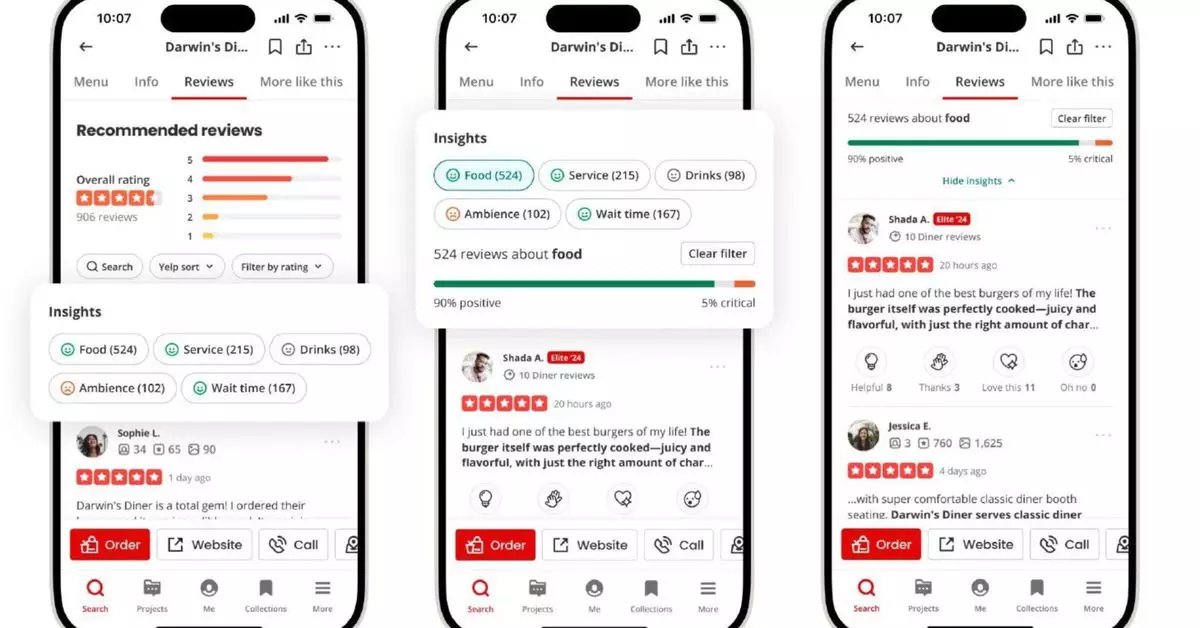In today’s digital age, discovering new dining spots or services has become a quintessential part of our daily lives. Yelp, a longstanding leader in customer reviews and local business searches, is stepping up its game, harnessing the power of artificial intelligence to enhance user experiences. Recently announced AI features are designed to help users navigate the vast ocean of reviews and establishments with unprecedented efficiency and insight. As we delve into these innovations, it is crucial to assess not just the features themselves, but their potential impact on user engagement and business perceptions.
The standout addition to Yelp’s offerings is the “Review Insights” feature, which allows users to grasp the collective sentiment surrounding various aspects of a business. This new tool employs advanced algorithms to summarize customer feelings towards crucial characteristics such as service quality, atmosphere, food, and wait times. By generating sentiment scores represented through facial icons that indicate positivity, neutrality, and negativity, Yelp provides users with an immediate snapshot of customer opinions. This shift towards AI-driven insights means that patrons no longer need to sift through countless reviews to find the information they care about most, a task that can often feel overwhelming.
The capability for users to click on specific topics and view related reviews serves to refine the search process significantly. It’s this granular approach to information dissemination that changes the search dynamics; users are empowered to prioritize what truly matters to them. In this era where convenience is king, Yelp appears poised to lead the charge in creating a more user-centric platform.
Furthermore, Yelp is upgrading its iOS app to include a trending drop-down in the search bar, showcasing popular search terms among local users. This not only adds an interactive element to the user’s discovery process but also contextualizes their search within a community framework. There’s a palpable shift from a purely transactional approach to one that emphasizes user engagement and interaction. Yelp’s decision to roll out similar features to its Android platform also signifies a commitment to inclusivity, ensuring that all users can benefit from these innovations.
The platform’s update will also introduce a more dynamic home feed. With features like new reviews, photos, and video content shared by users, Yelp transforms into a vibrant community space where experiences can be shared, rather than a mere repository of static reviews. Such enhancements indicate a clear understanding of contemporary user behaviors, where visual content often drives engagement.
As Yelp rolls out these features, the implications for businesses are also worth noting. Enhanced visibility into customer feedback means businesses can adapt more rapidly to meet consumer expectations. This can lead to improved service delivery and stronger customer relationships. However, it raises questions about how businesses will respond to this amplified scrutiny and whether they will actively engage with the feedback they receive.
Yelp’s innovative use of AI marks a significant evolution in how users interact with local businesses. With tools designed to streamline the review process and foster community interaction, Yelp is not just adapting to changes in user behavior; it is setting a new standard for what users can expect from digital platforms in their quest for discovery. As these features roll out, it will be fascinating to observe their effect on both consumers and the businesses they evaluate.


Leave a Reply